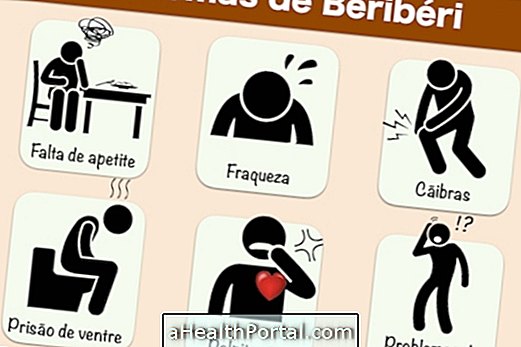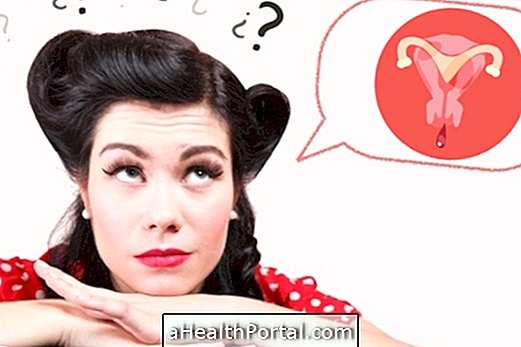Taking medicines without medical knowledge can be harmful to health because they have adverse reactions and contraindications that must be respected.
A person may take a painkiller or an anti-inflammatory when they have a headache or have a sore throat, but these medications should not be consumed for more than 3 days and persistence of these symptoms or with the onset of other symptoms is important to go to the doctor.

The 7 reasons for not taking medicines without medical advice are:
1. Development of superbugs
Using antibiotics on their own increases the person's risk of taking the wrong dose or for less time than it should, thus increasing the resistance of viruses and bacteria, thus decreasing the effectiveness of antibiotics. This can happen when the person takes antibiotics in the form of capsules, tablets, injections or even antibiotic ointments.
2. Masking Symptoms
By taking painkillers, anti-inflammatories or antipyretics on your own the person can disguise the symptoms he presents and so the doctor may have more difficulty in finding the diagnosis of the disease. In addition, anti-inflammatories such as Ibuprofen can cause gastritis, ulcer or cause digestive bleeding that may not be directly related to the disease, being only a complication of the remedy used.
3. May damage the liver and kidneys
The use of over-the-counter medicines can lead to liver poisoning, since medications can be accumulated in this organ, and also impair the functioning of the kidneys. As the kidneys are responsible for the filtration of blood, when it is full of medicines, it is more difficult to ensure the elimination of toxins. Although kidney function is most impaired in people who already have kidney problems, this can also happen in apparently healthy people.
4. Increase the risk of bleeding
Some over-the-counter medications like Paracetamol, which appears to be harmless, can lead to digestive hemorrhage, especially in people who have a more sensitive stomach. Usually this happens when a person eats a large amount of acetaminophen at one time, but it can also happen by ingesting 500mg a day over the course of months and so it is best to avoid unnecessary intake.
Aspirin also increases the risk of bleeding and therefore should only be consumed after medical advice, especially in times of epidemics such as dengue, as this is a medicine banned in case of dengue or suspected dengue.
5. Adverse reactions may occur
Certain medications should not be taken at the same time and therefore, if the person suffers from asthma or hypertension and needs to take medication daily, it is not recommended to take any other medicine without medical knowledge.
People with asthma can not even take Ibuprofen, which can be bought over-the-counter because they may suffer from an asthma attack, for example. Pressure medicines should only be used after the cardiologist has been told that they can cause electrolyte imbalance, headache, dizziness and pressure drop when used improperly.
In addition, the person may have an allergic reaction to the medication, which leads to the onset of symptoms such as difficulty in breathing, balls or swelling of the skin, being more common after the use of antibiotics, analgesics or anti-inflammatories.
6. May cause addiction
Analgesics, anxiolytics and antidepressants can cause addiction and leave the person addicted. In addition, over time, an increasing dose is required to achieve the same goal they can cause drowsiness, lack of motor coordination, vertigo and cardiovascular problems and therefore should only be used by medical indication, and should be respected. dosage and treatment time.
7. May be contraindicated in pregnancy or lactation
Most medications are contraindicated during pregnancy and also when the woman breastfeeds because they can harm the baby causing fetal malformation or kidney problems. When it passes through the milk, the medicine reaches the baby increasing the risk of a disease called reye syndrome that can be fatal. Therefore, especially at this stage the use of medications should only be done by the obstetrician's guidance.
Check out a list of Prohibited Medications in Pregnancy and Teas that the pregnant woman can not take.
What are over-the-counter medications
Although they are easily bought without a prescription, painkillers, anti-inflammatories, antibiotics and antihistamines should not be consumed freely whenever people think they have a flat cough, an insistent headache or back pain.
The pain is an alert that indicates that something is wrong, being necessary to investigate what is happening. By masking this symptom, the person may have a worsening of the disease. One very important care you should take is to read the package and the package insert for each medicine before using it. You may suspect that the remedy may have serious adverse reactions or contraindications when a red or black stripe is observed on the package.



- Red Tarja : Found in medicines that can be bought with a white prescription, such as antidysiphyde drugs or antidiabetics. They may have mild adverse reactions, such as nausea, diarrhea, or headache;
- Tarja negra: Found in medicines that work in the central nervous system and generally the prescription is blue and is kept in the pharmacy, as antidepressants, anxiolytics or medicines to lose weight. Their adverse reactions can be serious, such as deep sleep, constant forgetfulness and dependence.
How to Take Medications Safely
To take a medicine safely you must:
- Consult your doctor to indicate which medicine to take, the amount and time of taking;
- Read the package leaflet for the most common side effects that may occur;
- Do not follow the advice of friends or family members who took medication for symptoms similar to what you have, because the cause of the disease may not be the same;
- Do not take other medicines, natural remedies or take teas at the same time of treatment, without questioning the doctor, because in some cases, it decreases the effect of the medicine or leads to the interaction between them.
However, even in the case of over-the-counter medicines, which do not have a prescription card, you should ask your pharmacist for the best choice and keep the doctor informed in routine consultations about the habit of taking a particular medicine and frequency.
Patients at greater risk of taking medicines without medical indication
Although anyone can go wrong, the risks of developing serious health problems are even greater in:
- Babies and children: Because in most cases the remedies vary with age and weight, and may hamper child growth and development when given the wrong formula or an exaggerated amount.
- Elderly: because they take several drugs to control different diseases and the risk of interaction is greater;
- Individuals with chronic diseases, such as diabetes: because it may decrease the effect of the remedy to control the disease.
Therefore, the use of medications should only be used under medical supervision, even when symptoms such as headache, diarrhea or itchiness appear on the skin, or when you are thinking of taking some medicine to lose weight, even if it is natural, for example.

















